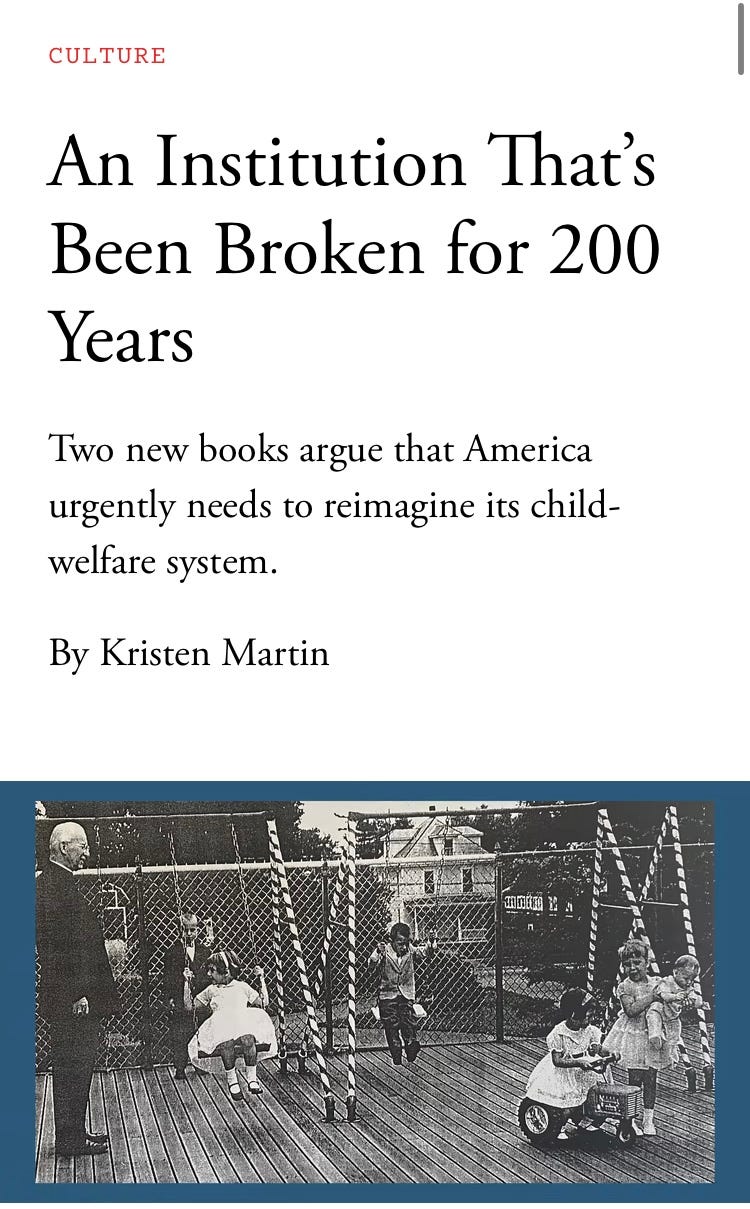In 2018, the year I started thinking that maybe someday I would write a narrative nonfiction book about orphanhood in America, two big stories broke in the world of child welfare. On March 26, a white married lesbian couple, Jennifer and Sarah Hart, drove their SUV off a cliff in Mendocino County, California, killing themselves and the six Black children—Markis, Hannah, Abigail, Devonte, Jeremiah, and Ciera—they had adopted from foster care. You’ve undoubtedly heard this story, heard about how Jennifer posted breathlessly on Facebook her family while behind the scenes, she and Sarah abused and neglected them. Maybe, like me, you listened to the podcast Broken Harts, which treated the murder-suicides as true crime mystery to solve, with the focus on Jennifer and Sarah’s motives. The fact that the children who died had been removed from their first families by CPS was an afterthought in most media coverage, if it was mentioned at all.
That fall, a story that might not seem related went viral on BuzzFeed News. Journalist Christine Kenneally’s “We Saw Nuns Kill Children” exposed the horrors experienced by children in the mid-twentieth century at a Catholic orphanage in Vermont called St. Joseph’s. The lede focuses on a woman named Sally Dale, who recalled seeing a nun push a child out of a window at the orphanage and seeing his body bounce off the ground outside and then go limp. I felt physically ill the first time I read the article, and found myself returning to it in late 2021 as I worked on the book proposal that would become American Orphan.
Last month, Kenneally’s book Ghosts of the Orphanage: A Story of Mysterious Deaths, a Conspiracy of Silence, and a Search for Justice, which expands on her BuzzFeed News investigation, and Roxanna Asgarian’s book on the Hart family murder-suicides We Were Once a Family: A Story of Love, Death, and Child Removal in America were both published. Unlike most media coverage of the Hart story, Asgarian looks head-on at the role the child welfare system played in Markis, Hannah, Abigail, Devonte, Jeremiah, and Ciera’s deaths, tracing how they came to be removed from their families in Texas and adopted by the Harts across state lines.
I’d been hotly anticipating these books since I had first learned they were in the works, and knew I wanted to write about them together, to connect the dots between them and show how taken together, they demonstrate how child welfare in America has always been broken and has never meaningfully addressed the real problem that most families within the system face—not parental death, but poverty. To add insult to injury, as Kenneally’s and Asgarian’s books attest, after removing children from their homes, the system inflicts further harm and trauma on them. This has been the case for more than two-hundred years now. The folks at The Atlantic took me up on it, and you can read the resulting piece here.
There is so much more I wanted to say about these books and about orphanages and foster care in America that I couldn’t fit into the piece, which I suppose is a good thing because I am writing my own book on child welfare and its brokenness. But one thing I wanted to highlight further here about both Ghosts of the Orphanage and We Were Once a Family is how while the stories they center on might seem extreme, and in the case of the horrific abuse that occurred routinely at orphanages, hard to believe at first, they are actually examples of our country’s child welfare system working as designed.
The dek, or subtitle, that the piece ran with (fun fact: writers almost never get to write or choose these things!) reads that “America urgently needs to reimagine its child-welfare system.” To take that idea a step further, the reimagining that I think is necessary is abolition.
Abolition is, to many people, a scary word, and when I first started working on my book, I didn’t think that abolition was necessary. But when you consider that the problem that the vast majority of families in the system have faced from the 1800s to now has been poverty—not being orphaned, not being physically or sexually abused—and that the big reform of the system from institutions to foster care has not fixed that problem and has in the process compounded trauma and made kids less safe, it’s easier to get to an abolitionist position.
Earlier this week, I Zoomed into a lecture on this very topic by the brilliant Alan Dettlaff, a founder of the upEND Movement and former dean at the University of Houston Graduate College of Social Work. Alan’s own book on this racist origins of the system is coming out this fall.
If you’re curious about what it would look like to get rid of child welfare as we know it and build new systems of support for children, family, and communities, I recommend following Alan and upEND, as well as checking out the work of law scholar Dorothy Roberts, particularly her book Torn Apart. More on all of this TK in my own book!
I am hoping to get into the groove of posting on here more often and sharing more about what I’m learning and reading in the world of child welfare. It’s been a busy start to the year (can I still say that in April?), but after the next couple of weeks I should have some more space to focus primarily on finishing up my manuscript and, in turn, sharing some thoughts here. I hope you’ll join me.





